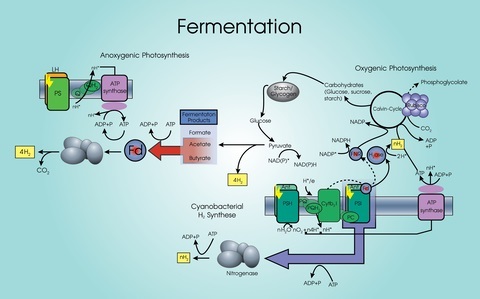
 Data Structure
Data Structure Networking
Networking RDBMS
RDBMS Operating System
Operating System Java
Java MS Excel
MS Excel iOS
iOS HTML
HTML CSS
CSS Android
Android Python
Python C Programming
C Programming C++
C++ C#
C# MongoDB
MongoDB MySQL
MySQL Javascript
Javascript PHP
PHPPhysics
Chemistry
Biology
Mathematics
English
Economics
Psychology
Social Studies
Fashion Studies
Legal Studies
- Selected Reading
- UPSC IAS Exams Notes
- Developer's Best Practices
- Questions and Answers
- Effective Resume Writing
- HR Interview Questions
- Computer Glossary
- Who is Who
Production of Fine Chemicals for the Pharmaceutical Industry Using Microbes
Introduction
Fine chemicals are complex, highly purified compounds used in the pharmaceutical industry for the production of drugs, cosmetics, and food additives. The demand for fine chemicals has been steadily increasing over the years, owing to their crucial role in the manufacturing of high-quality pharmaceuticals.
The production of fine chemicals through traditional chemical synthesis can be challenging, expensive, and time-consuming, leading to an increasing focus on alternative and more sustainable production methods. One of the most promising methods of producing fine chemicals is microbial fermentation.
Microbial fermentation has been used for centuries in the production of various fermented foods and beverages. Recent advancements in biotechnology have enabled the use of microbial fermentation for the production of a wide range of fine chemicals, including amino acids, vitamins, enzymes, and antibiotics.
Discussed below is the production of fine chemicals for the pharmaceutical industry using microbes and the various advantages and challenges associated with this method.
Microbial Fermentation
Microbial fermentation is a process that involves the conversion of organic compounds by microorganisms, such as bacteria, yeast, or fungi, into other organic compounds.

Production of Fine Chemicals Using Microbes
Microbial fermentation has been used extensively in the production of fine chemicals for the pharmaceutical industry.
Amino Acid Production
One of the most commonly produced fine chemicals through microbial fermentation is amino acids. Amino acids are the building blocks of proteins and are essential for the growth and development of living organisms. They are also used in the production of drugs, food additives, and animal feed.
The production of amino acids through microbial fermentation involves the use of microorganisms, such as Corynebacterium glutamic, Escherichia coli, and Bacillus subtilis. These microorganisms are genetically modified to increase their production of specific amino acids, such as glutamic acid, lysine, and methionine.
Vitamin Production
Another commonly produced fine chemical through microbial fermentation is vitamins. Vitamins are essential organic compounds that are required in small amounts for the proper functioning of the body. They are used in the production of drugs, food additives, and animal feed.
The production of vitamins through microbial fermentation involves the use of microorganisms, such as bacteria and yeast, that are genetically modified to produce specific vitamins, such as vitamin C, vitamin B12, and vitamin K.
The microorganisms are grown in large-scale fermenters containing a nutrient-rich medium, and the vitamins are extracted from the fermentation broth using various purification methods.
Enzyme Production
Enzymes are another important group of fine chemicals produced through microbial fermentation. Enzymes are protein molecules that catalyse specific biochemical reactions in the body. They are used in the production of drugs, food additives, and industrial processes.
The production of enzymes through microbial fermentation involves the use of microorganisms, such as bacteria and fungi, that are genetically modified to produce specific enzymes, such as proteases, amylases, and lipases.
The microorganisms are grown in large-scale fermenters containing a nutrient-rich medium, and the enzymes are extracted from the fermentation broth using various purification methods.
Antibiotic Production
Antibiotics are another class of fine chemicals produced through microbial fermentation. Antibiotics are natural or synthetic compounds that kill or inhibit the growth of bacteria. They are used in the treatment of bacterial infections and are essential to modern medicine.
The production of antibiotics through microbial fermentation involves the use of microorganisms, such as Streptomyces, that naturally produce antibiotics. The microorganisms are grown in large-scale fermenters containing a nutrient-rich medium, and the antibiotics are extracted from the fermentation broth using various purification methods.

Advantages of Microbial Fermentation for Fine Chemical Production
Microbial fermentation has several advantages over traditional chemical synthesis for the production of fine chemicals.
Lower Production Costs
Microbial fermentation is a more cost-effective method of producing fine chemicals compared to traditional chemical synthesis. The process requires less energy and resources, and the raw materials used are often less expensive.
Higher Yields
Microbial fermentation can produce higher yields of fine chemicals compared to traditional chemical synthesis. The process is highly efficient, and the microorganisms can be genetically modified to increase their production of specific compounds.
More Sustainable
Microbial fermentation is a more sustainable method of producing fine chemicals compared to traditional chemical synthesis. The process produces fewer toxic by-products and requires less energy, making it more environmentally friendly.
More Scalable
Microbial fermentation is a highly scalable process, making it suitable for large-scale industrial production. The process can be easily adapted to produce different types of fine chemicals, making it a versatile production method.
Challenges Associated with Microbial Fermentation for Fine Chemical Production
While microbial fermentation has several advantages for the production of fine chemicals, there are also several challenges associated with this method.
Contamination
Microbial fermentation requires a sterile environment to prevent contamination by unwanted microorganisms. The presence of unwanted microorganisms can reduce the yield of the desired product or result in the production of unwanted by-products.
Genetic Modification
The genetic modification of microorganisms used in microbial fermentation can be time-consuming and costly. It also raises ethical concerns related to the safety and regulation of genetically modified organisms.
Extraction and Purification
The extraction and purification of fine chemicals from the fermentation broth can be challenging and expensive. The process often involves multiple steps and requires specialized equipment and expertise.
Yield Optimization
The optimization of the yield of fine chemicals produced through microbial fermentation can be challenging. The yield is dependent on several factors, such as the choice of microorganism, nutrient composition of the medium, and fermentation conditions.
Conclusion
Microbial fermentation is a promising method of producing fine chemicals for the pharmaceutical industry. The process offers several advantages over traditional chemical synthesis, including lower production costs, higher yields, and more sustainable production. However, there are also several challenges associated with this method, such as contamination, genetic modification, and yield optimization.
Despite these challenges, microbial fermentation has already proven to be a successful method of producing fine chemicals, including amino acids, vitamins, enzymes, and antibiotics. With continued advancements in biotechnology, microbial fermentation is likely to become an even more important method of producing high-quality fine chemicals for the pharmaceutical industry.

